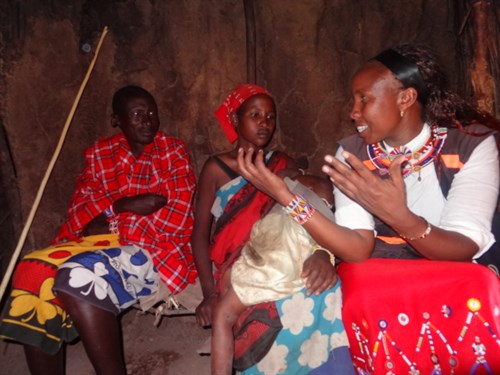
Implications of the community health policy change in Kenya in light of world health worker week #WHWWeek

By Rosalind McCollum,
Kenya’s community health strategy (2006) expounds the country’s plan to expand access to community health care for the whole population, through two close-to-community providers: community health workers (CHWs) (community selected community members who carry out a range of activities at household level) and community health extension workers (CHEWs) (government selected workers who supervise CHWs among other community health tasks).
Kenya is currently revising the strategy for community health, which will result in a proposed increased number and role of county government salaried CHEWs working at community level. These changes are occurring alongside the process of political devolution, which results in shifting responsibilities for health from national to county level and changing health priorities and health service implementation between counties.
New community health study conducted in Kenya
Recent qualitative research conducted by REACHOUT in Kenya revealed that communities greatly appreciate and value the work of their local CHW. However, lack of funds to pay salaries for CHWs was identified as a threat to the sustainability of the community health strategy in Kenya, due to high CHW attrition and lack of accountability, leading to the need to revise the strategy. Policymakers describe a desire for evidence based revision of the strategy
“I think that it is very important that the lessons and the challenges should inform the decision to revise the community strategy ... so that we can come up with something that can work well for us and we can remove what we feel did not work well for us.” (Policymaker)
This research highlighted a number of key limitations associated with the current strategy, including: poor distribution of community units; uncertain level of community engagement with CHEWs (who will have a greater community role according to the revised strategy); expectations for greater service integration (including home based HIV testing and counselling); irregular and poorly structured supervision; demand for incentives and current heavy workload for CHEWs.
What are the implications of world health worker week for policy change in Kenya?
World health worker week provides a fantastic opportunity to support health workers, including CHWs and CHEWs, by recognising and celebrating the amazing work which they do. However, world health worker week also presents us with a challenge to call on those in power to ensure that these health workers are equipped to do their jobs safely and effectively.
With the shifting power dynamics associated with devolution, the 47 Kenyan county governments now have increased autonomy and power in decision making for health. Devolution brings with it unique opportunities and challenges for each county to influence equity of health service provision, since decision making is brought closer to communities. Counties can now prioritize services for more equitable coverage, addressing county specific health burdens and allowing for greater coordination between actors and opportunity for stronger community participation at county level. However, devolved county authorities also have authority to prioritize services and resources which may result in greater rather than reduced inequities.
Advocacy is needed at county government level to demonstrate the potential benefits of the revised strategy, to promote financial investment in community health and to tackle the exposed challenges experienced by close-to-community providers such as supervision, incentives and workload. In this way ensuring that close-to-community providers are more effectively supported and equipped to do their work through implementation of the revised strategy.
Recent news
- REACHOUT quality improvement cycle in Indonesia: Our work in pictures, 9 April 2015
- Communicating better about community health workers: Reflections on #ResUpMeetUp, 30 March 2015
- Gender Equity Analysis: A necessary prerequisite for addressing gender related outcomes, 24 March 2015

This project is funded by the European Union.